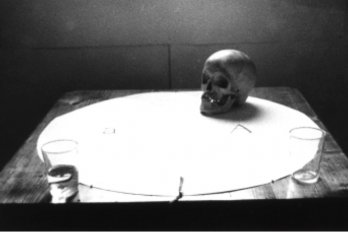
jerusalem—Forty or so evangelical Christians march wearily into the Time Elevator waiting room, happy to find air conditioning and comfortable seats. It is the last of a whirlwind five-day tour of Israel, which saw the group visit an assortment of kibbutzim, museums, churches, and synagogues, sometimes sprinting from the tour bus in an effort to stay on schedule. Some in the group grumble that the tour is wreaking havoc on their earthly bodies. Unfortunately, the Time Elevator proves to be little respite.
A religion-themed simulator, the Time Elevator’s ninety seats shudder, undulate, and bounce in unison with the action on the screen. Imagine Israel by imax, with seats that won’t stay still. The elevator is nothing if not efficient, reviewing some 3,000 years of Jerusalem’s history in just under thirty minutes, a “unique and unforgettable experience that combines learning and enjoyment in the best tradition of ‘edutainment!’ ” At least, that’s what the brochure promises. The ride, though, does not explore the last five years of violence (the second Intifada, the West Bank and Gaza pullouts), which have crippled Israel’s tourism industry.
Christian pilgrims tend to be well off, devout, and repeat visitors to Jerusalem. They constitute an increasingly important demographic, which is why the Israeli Government Tourist Office has sponsored this all-expenses-paid trip for forty-one Americans, along with twenty-two British and seventeen Canadian religious leaders.
According to evangelical beliefs, the return of Jews to Israel and the building of the Third Temple will signal the second coming of Jesus. Unfortunately for Jews, the same beliefs dictate that any Jew who does not convert to Christianity will be incinerated upon the Messiah’s return. But these are small details. What’s important is that Christians spend money, leave satisfied, and spread the gospel about the Promised Land back home.
The Time Elevator, which receives 100,000-plus visitors a year, is a tiny piece of the equation. Once the Christians strap on their mandatory seatbelts, a cautionary public announcement advises against riding the elevator if you’re sick or pregnant. Then the lights dim and an earthquake erupts on screen. The seats lurch forward and the audience is plunged into Jerusalem’s underground depths, where they meet a wizened, bearded man named Shalem. “What is stable except time itself? ” he babbles. Certainly not the career of Chaim Topol, the Israeli actor who plays Shalem with hammy, B-movie aplomb—a far cry from his Oscar-nominated turn (billed simply as “Topol”) in Fiddler on the Roof nearly thirty-five years ago. Part rabbi, part bemused sorcerer, Shalem guides us through the various historical layers of Jerusalem in his time elevator. But it’s what Shalem omits that requires an even bigger suspension of disbelief. The Muslim influence on Jerusalem, for example, is a mere annotation to its Judeo-Christian origins.
Shalem and the evangelical Christians cruise through the Babylonian Empire, where Jeremiah predicts the fall of the city. After the destruction of the First Temple, the Christian audience is baptized with mist falling from the ceiling as they enter a Maccabean tunnel. With a shudder from the seats, it’s off through the Persian conquest, then the Romans, the completion of the Second Temple, and the Diaspora. The Crucifixion is judiciously skipped, thereby avoiding any Passion of the Christ-style questions about Jewish complicity in the death of Jesus. Christ is barely mentioned at all, actually, referred to only in a corny dramatized flashback as the Romans are building the city of Aelia Capitolina on Jerusalem’s ruins.
“What’s with you?” a Roman asks an elderly, sour-faced Christian.
“He’s bitter because we burned down his temple, and he’s upset because we crucified some guy,” responds another Roman, this one resplendent in a toga.
“Some guy?” the Christian explodes. “You murdered the son of God!”
“God? Which god? There are lots of gods!” the second Roman responds.
“One,” says Chaim Topol, playing an equally sour Jew. “One God.”
Cue Muhammad and the Muslims, and in a flash Jerusalem is home to three monotheistic religions. Islam is dispatched almost as quickly as it arrives. After a nod to the Dome of the Rock, the religion is hardly mentioned again. The elevator then speeds past several centuries—the Ottoman Empire is a 400-year footnote—and suddenly it is the late nineteenth century and Jews are returning en masse. A triumphant soundtrack accompanies the War of Independence and the Six-Day War. Yasser Arafat and the Palestinian cause are not mentioned at all. “Three thousand years sounds like a long time,” Shalem says wisely. “And yet, we’ve only just begun.” The room erupts with applause.
As the lights come on, the Christians hurry out of their seats. The buses, and a driving tour of Israel’s parliament buildings, await. “I loved it,” says Dr. John Reynolds, a Baptist pastor from Florida. “I’d like to start my tour of Jerusalem here.” Many others are just as effusive, though Pastor Bruce Watt of Peoria, Illinois, takes issue with some of the facts. “The Babylonian captivity lasted for fifty years?” Watt says, shaking his head in dismay. “It should have been seventy years, according to the Book of Jeremiah. Everybody knows that.”



